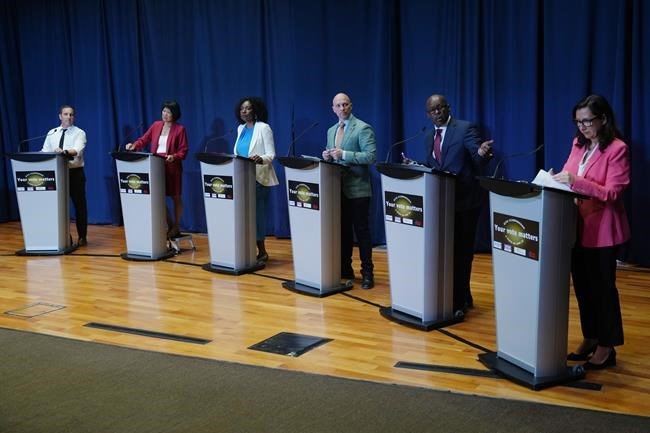TORONTO — When Torontonians enter the polling booth on June 26 to elect a new mayor, they will stare down a ballot with 102 candidates before marking a single vote.
Whoever gets the most votes wins, regardless of their share of the overall ballots cast.
With more than half a dozen high profile candidates in the packed field, city hall watchers say the next mayor of Canada's most populous city could be elected with less than a third of the popular vote.
"That's not good for democracy," said John Beebe, founder of the Democratic Engagement Exchange at Toronto Metropolitan University.
The next mayor could be handed the weakest democratic mandate in Toronto's history while inheriting largely untested "strong mayor" powers, allowing them to pass budgets with just one-third council support, veto bylaws and unilaterally shape the city's top-level administration.
Electoral reform advocates have long argued Toronto's use of a first-past-the-post system is outdated, saying it fuels polarized campaigns and unrepresentative results. But the record number of candidates this election has exposed glaring issues, advocates say.
"It's the worst possible system to choose a mayor. And this is definitely a case study in why we need to change our election procedures," Beebe said.
Under a ranked ballot mayoral election, like one used in San Francisco, candidates need a majority of votes to win.
If a first round does not produce a winner there is an instant run-off where the candidate with the fewest votes is eliminated. Their supporters' next ranked choice gets those votes. The process repeats until someone gets a majority.
Skeptics, from city council to the House of Commons, have suggested the system could confuse voters, favour centrists and come with costs to replace an imperfect but nonetheless familiar first-past-the-post process.
Proponents, meanwhile, say a ranked ballot would eliminate vote splitting and garner a more diverse slate of candidates.
Lower-profile candidates would face less pressure to drop out and endorse bigger names. Advocates say it could curb polarization at a time of collapsing democratic trust. Candidates, the argument goes, are incentivized to limit attacks on rivals to avoid alienating that person's supporters.
And importantly, especially with 102 candidates, it ensures the winner has broad support, said Coun. Shelley Carroll, one of the ranked ballot system's most vocal supporters at Toronto City Hall.
"That can only be healthy for the city. Because now the person knows they have a real mandate," she said.
Toronto looked ready to move beyond first-past-the-post when council voted in September 2020 to hold public consultations with an eye to bringing in ranked ballots for the 2026 election.
It was part of a wave of electoral reform sweeping Ontario after the provincial government, the rule-setter for municipal elections, changed the law in 2016 to allow for ranked ballots. London, Ont., held a ranked ballot election in 2018, while other Ontario municipalities, including Cambridge and Kingston, supported referendums endorsing the switch for the 2022 vote.
But in October 2020, the Progressive Conservatives under Premier Doug Ford reversed the changes made by the previous government and blocked municipalities from holding ranked ballot elections.
"They don't see it as in their interest," said Dennis Pilon, an associate professor in York University's department of politics.
"(First-past-the-post) allows them to drill down into their base of support and exploit divisions across the rest of the political spectrum."
A spokesperson for Municipal Affairs Minister Steve Clark said the government "believed it was important that the way Ontarians elect their municipal representatives is the same as how they elect their provincial and federal ones."
Toronto Elections, meanwhile, said the city clerk took no position on ranked ballots and any changes to the Municipal Elections Act were the purview of the province.
Pilon, of York University, said Toronto would benefit most from a form of proportional representation. It would require broader reforms at city hall, and would see the mayor folded back into council, which would run on a type of parliamentary model.
"We would get a much more representative council," said Pilon, a member of the national advisory board for Fair Vote Canada, a non-profit advocating for proportional electoral systems.
Advocates say there are other reforms that could make Toronto elections better, including a requirement for candidates to make some campaign finance disclosures ahead of election day as well as extending the vote to permanent residents.
Introducing political parties has also been floated, with supporters saying it could help voters make more informed choices and detractors fearing it could undermine consensus building at city hall, Beebe, of Toronto Metropolitan University, said.
A more straightforward fix, said Beebe, could begin with raising the current 25-signature threshold required to get on the mayoral ballot. With nearly two million eligible voters in the last election, advocates say a higher threshold would cut down on vanity candidates and ensure mayoral hopefuls start with proven grassroots support.
"If we have only one takeaway from the elections, let's just update that," Beebe said.
This report by The Canadian Press was first published June 12, 2023.
Jordan Omstead, The Canadian Press

